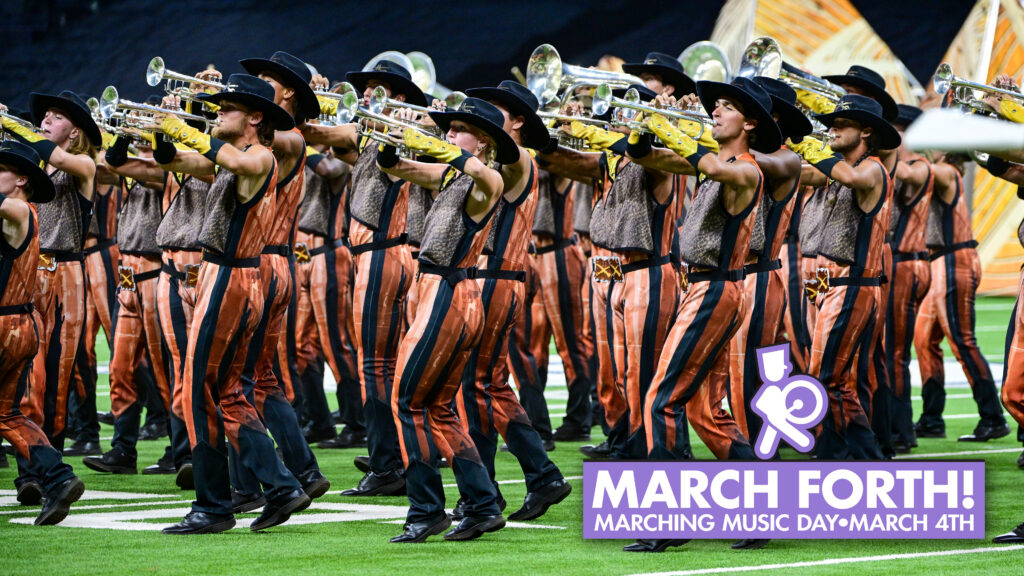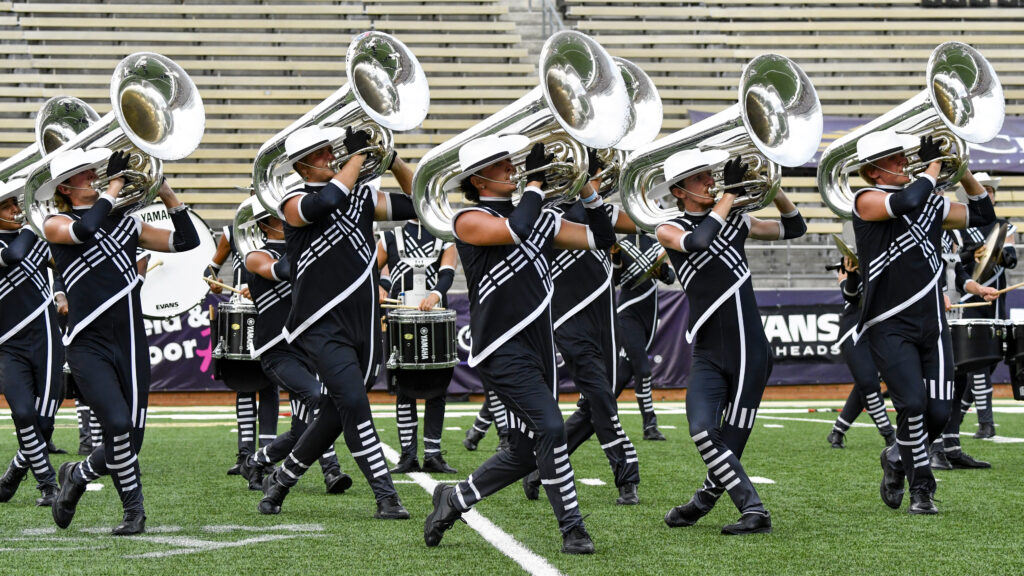Well, this is the last Friday that I can get by with doing my annual spring cleaning column, as summer is officially just around the corner. These, along with my end-of-the-year loose end columns, are typically excuses to take a bunch of great submissions not long enough to stand on their own, put them together with no concern for continuity, and call it a complete product. There’s a joke in there about drum corps shows through the 1960s, but I’m not going in looking for it. And no, I don’t want to be spammed for that feeble attempt at humor and I know many reflect on those days with a smile and a sigh. And I love seeing the reunion corps re-create such shows, as they are fun to watch and are a valuable history lesson for us all. But all I’m referring to is the continuity angle of taking “American’s We,” “Theme from King of Kings,” “The Magnificent Seven,” “Theme from the Andy Griffith Show,” “Ode to Joy from Beethoven’s Symphony No. 9,” “The Wiffenpoof Song,” “Hail, Hail, the Gang’s All Here,” “Ave Maria,” “Columbia, the Gem of the Ocean,” “Let There Be Peace on Earth,” “I Wish I Were an Oscar Meyer Weiner,” a drum solo based on “Sing, Sing, Sing/H-A-R-R-I-G-A-N” and somehow condense them into the same show BEFORE the concert standstill production of “The Continental/Take the ‘A’ Train/Holiday for Strings/Finale from Tchaikovsky’s Symphony No. 4.” And that is the spirit of the four different contributions in today’s column. Enjoy.
Jeff King of Indianapolis sent in the following idea. Feel free to send me your contributions on the topic to [email protected]. I thought it might be interesting to do an article on legendary soloists over the years of drum corps. My drum corps experience doesn’t go back as far as many, starting about 1976, so I’m sure there are many from earlier years that would qualify. Some names I think of are: Chris Metzger (Madison Scouts 1974-1977), Bonnie Ott (Blue Devils 1974-1976), “Goober” Chesnovitz (Al Chez) (Garfield Cadets 1978-1982), Greg “Harpo” Blum (Colts 1976-1982). I particularly remember mellophone soloist Barbara Mahoney (Garfield Cadets 1981-1985) from the 1984 “West Side Story” show. I’m sure there are many others. They were the people that could light up the crowd. I remember one of those people from a long-gone corps, the Sundowners. This soloist made it all worthwhile. I thought it might be interesting to talk about what they did in the day and possibly where they are now. At least I think that would be interesting. I had the opportunity to be on the Colts’ visual staff for a couple of years. During and extended stay at a school somewhere, the visual staff had the opportunity to have lunch at Pizza Hut, get something to eat and just talk. That staff was made up a mix of vets and new people. A number of us were older and remembered the earlier days. The “youngsters” basically had recently aged out. While we talked about many group from the 1970s, I turned to one of the younger members and asked them if they had ever seen any of the groups we were talking about. Amazingly, he responded “no,” that he’d never seen any drum corps prior to 1996. It then hit me that it was a shame that many people in the activity really don’t know the history of it and how important that is. I’m not saying everything should be done like it used to be. I just think it’s important to know what happened before you, who made it happen and how the activity evolved to become what it is today. Kim Fox-Kristensen, wife of percussion judge Allan Kristensen, contributed the following. I was brought into contact with drum corps late in life when my husband was working with Santa Clara Vanguard’s drum line in 1987. He’s been judging now for many years. In 1996, my husband judged percussion on the field at the DCI World Championship Finals. It was the first year of a tie for the Championship. Of course, everybody was heartbroken, including the judges. As I sat in the stands with a couple of friends, I got to hear all of the ridiculous comments being made about how the judges know ahead of time who’s going to win and that the judges get together when they are figuring out their scores. Anyway, while my friends and I drove back to Lake Buena Vista, we stopped at a completely disgusting all-night restaurant to try and get a bite to eat. As there was nothing else open at that time of night, we had to wait for a place to sit. The man waiting in front of us turned around to look at us and noticed my companion’s drum corps T-shirt. He commented, “So, who was out there judging tonight, Larry, Moe and Curly?” And for once in my life, I was able to come up with a snappy retort when I needed it (and not an hour later) and responded, “I’m married to Moe.” At least he had the decency to look slightly abashed. Fawn Margolis Hodgdon contributed the following thoughts on marching with a smaller corps. It is very true that the top Division I corps get an amazing number of prospective members, yet there are far too many corps struggling to fill their ranks. Kids would rather not march at all? Not get the experience they will need for trying again next time? I don’t get it! Let’s face it, everyone loves a winner! Everyone loves a big crowd! But I am here to say that the real gift kids can give to themselves is the opportunity to march somewhere! Division II & III corps can provide a person with higher aspirations, a great beginning. I was a member of a class “B” corps in the 1970s. It was thrilling just to get on the field! It was incredible to be with a family that I practiced with during the week and traveled with every weekend during the summer. Nearly 30 years later, many of those people are still a part of my life. That’s what corps did for me. My son started out marching with the corps where I teach guard, 7th Regiment. He never played a horn but learned and never looked back. He is now with the Division II Spartans for the second year playing soprano. He wants to join a Division I corps, but if he doesn’t make it, he’ll continue to march with Spartans. He often tells his music friends here to come to a 7th Regiment practice. It’s affordable and offers them an opportunity to still have a job during the summer. The point he makes to them is that marching in a corps is the best! They should just try it. Not everyone can march in the big corps, that’s a simple fact. I received the following from a reader. Can anyone verify the following—or conclusively state that they are drum corps myths—or offer some additional info for a future Fanfare column? Peter Jennings marched in Scout House. He played lead soprano and had a solo in “Parade of the Wooden Soldiers.” Alec Trebeck, the Canadian TV personality from “Jeopardy,” was a rudimental bass drummer in the old Michael Power Knights. Larry Kerchner actually marched, played French Horn and wrote the music for Blue Rock, all though the 1960s. He also has stage, recording and screen credits to his name. TV Judge Joe Brown was color guard captain of the old Wynn Center Toppers, and Judge Judy Schiendlin was color guard captain of the old Loretto Knights. TV host Regis Philbin played French horn in the Cedar Rapids Cadets. John Gotti and ‘”Sonny” Garvano were lead (what else) “Sopranos” in the old Vasella Musketeers. Chuck Connors, an alumnus of the old OLPH Ridgemen, played in “The Rifleman” in the old 1960s TV series. He also played baseball for the Yankees. Any others?
Michael Boo has been involved with drum and bugle corps since 1975, when he marched his first of three seasons with the Cavaliers.
He has a bachelor’s degree in music education and a master’s degree in music theory and composition.
He has written about the drum corps activity for over a quarter century for publications such as Drum Corps World, and presently is involved in a variety of projects for Drum Corps International, including souvenir program books, CD liner notes, DCI Update and Web articles, and other endeavors. Michael currently writes music for a variety of idioms, is a church handbell and vocal choir director, an assistant director of a community band, and a licensed Realtor in the state of Indiana. His other writing projects are for numerous publications, and he has published an honors-winning book on the history of figure skating. His hobbies include TaeKwonDo and hiking the Indiana Dunes. But more than anything, Michael is proud to love drum corps and to be a part of the activity in some small way, chronicling various facets of each season for the enjoyment of others.





